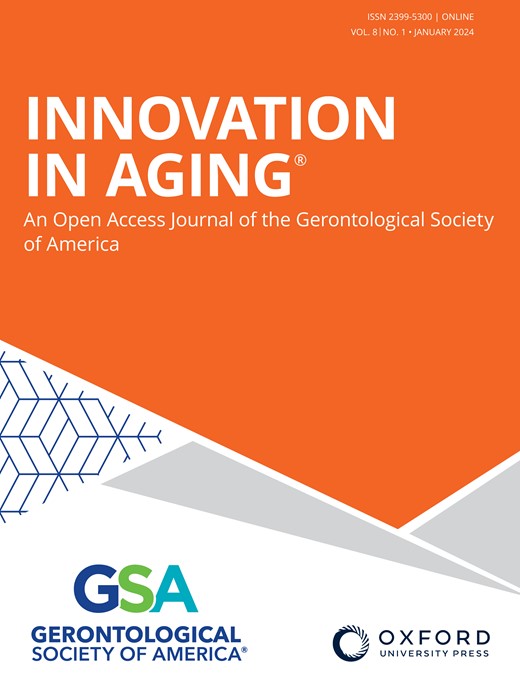GENDER DIFFERENCES IN THE ASSOCIATION BETWEEN SLEEP AND INFLAMMATORY MARKERS: RESULTS FROM THE EINSTEIN AGING STUDY
IF 4.9
3区 医学
Q1 GERIATRICS & GERONTOLOGY
引用次数: 0
Abstract
Abstract Prior research links poor sleep and higher systemic inflammation. Gender differences in both sleep and in inflammatory responses have been observed. We investigated gender differences in the association between levels as well as variability of objective sleep health and inflammatory markers (including stimulated inflammatory markers) among a diverse sample of older adults. Participants free of dementia (N=215, Mage=77.5 years, 64% women; 46% White, 39% Black, 15% Hispanic/other) were from The Einstein Aging Study. Actigraphy (2 weeks) yielded wake after sleep onset (WASO), total night sleep time (TST), and midpoint night sleep. Inflammatory markers included circulating C-reactive protein (CRP) and circulating and lipopolysaccharide (LPS)-stimulated levels of interleukin (IL)-1β, IL-4, IL-6, IL-8, IL-10, and tumor necrosis factor (TNF)-𝛼. Bayesian variability models evaluated associations of inflammatory markers with mean and variability of sleep measures, adjusted for BMI, gender, age, education, race/ethnicity. Circulating inflammatory markers were not associated with sleep measures, except higher TST variability with higher circulating IL-6 among women. For stimulated cytokines, among men, higher mean WASO, TST, and later midpoint were associated with higher stimulated IL-8 and TNF-𝛼. All stimulated cytokines except IL-1β were associated with greater variability in WASO, TST, and sleep timing among men. Among women, the only significant association with stimulated cytokines was between higher mean TST and higher stimulated IL-8. We found gender differences in the associations between sleep and inflammation in older adults, primarily in men and for stimulated (not circulating) cytokines. Interestingly, associations were also more frequently observed for sleep variability than mean levels.睡眠与炎症指标之间的性别差异:爱因斯坦老龄化研究的结果
摘要 先前的研究表明,睡眠质量差与全身炎症反应较高有关。在睡眠和炎症反应方面都观察到了性别差异。我们在不同的老年人样本中调查了客观睡眠健康水平和炎症标志物(包括刺激性炎症标志物)之间的性别差异。没有痴呆症的参与者(人数=215,年龄=77.5 岁,64% 为女性;46% 为白人,39% 为黑人,15% 为西班牙裔/其他族裔)来自爱因斯坦老龄化研究。动觉计(2 周)显示了睡眠开始后的唤醒(WASO)、夜间总睡眠时间(TST)和夜间睡眠中点。炎症指标包括循环C反应蛋白(CRP)、循环和脂多糖(LPS)刺激的白细胞介素(IL)-1β、IL-4、IL-6、IL-8、IL-10和肿瘤坏死因子(TNF)-𝛼的水平。贝叶斯变异性模型评估了炎症标志物与睡眠测量的平均值和变异性之间的关系,并对体重指数、性别、年龄、教育程度、种族/民族进行了调整。循环炎症标志物与睡眠指标无关,但女性的 TST 变异性较高,而循环 IL-6 较高。就受刺激的细胞因子而言,在男性中,WASO、TST 平均值越高,中点越晚,受刺激的 IL-8 和 TNF-𝛼 就越高。除 IL-1β 外,所有受刺激的细胞因子都与男性 WASO、TST 和睡眠时间的较大变异性有关。在女性中,唯一与受刺激细胞因子有显著关联的是较高的平均 TST 和较高的受刺激 IL-8。我们发现,老年人的睡眠与炎症之间存在性别差异,这主要体现在男性和受刺激细胞因子(而非循环细胞因子)上。有趣的是,与平均水平相比,我们更经常观察到睡眠变异性与炎症之间的关联。
本文章由计算机程序翻译,如有差异,请以英文原文为准。
求助全文
约1分钟内获得全文
求助全文
来源期刊

Innovation in Aging
GERIATRICS & GERONTOLOGY-
CiteScore
4.10
自引率
0.00%
发文量
72
审稿时长
15 weeks
期刊介绍:
Innovation in Aging, an interdisciplinary Open Access journal of the Gerontological Society of America (GSA), is dedicated to publishing innovative, conceptually robust, and methodologically rigorous research focused on aging and the life course. The journal aims to present studies with the potential to significantly enhance the health, functionality, and overall well-being of older adults by translating scientific insights into practical applications. Research published in the journal spans a variety of settings, including community, clinical, and laboratory contexts, with a clear emphasis on issues that are directly pertinent to aging and the dynamics of life over time. The content of the journal mirrors the diverse research interests of GSA members and encompasses a range of study types. These include the validation of new conceptual or theoretical models, assessments of factors impacting the health and well-being of older adults, evaluations of interventions and policies, the implementation of groundbreaking research methodologies, interdisciplinary research that adapts concepts and methods from other fields to aging studies, and the use of modeling and simulations to understand factors and processes influencing aging outcomes. The journal welcomes contributions from scholars across various disciplines, such as technology, engineering, architecture, economics, business, law, political science, public policy, education, public health, social and psychological sciences, biomedical and health sciences, and the humanities and arts, reflecting a holistic approach to advancing knowledge in gerontology.
 求助内容:
求助内容: 应助结果提醒方式:
应助结果提醒方式:


